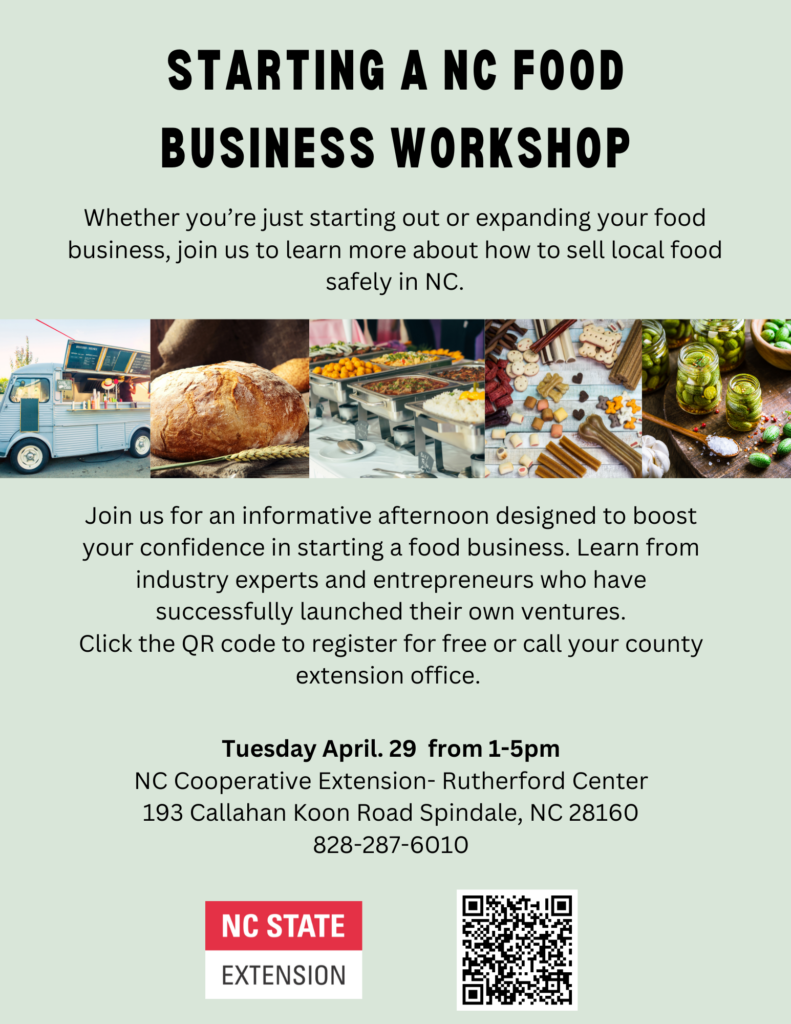Starting a NC Food Based Business
go.ncsu.edu/readext?1067470
en Español / em Português
El inglés es el idioma de control de esta página. En la medida en que haya algún conflicto entre la traducción al inglés y la traducción, el inglés prevalece.
Al hacer clic en el enlace de traducción se activa un servicio de traducción gratuito para convertir la página al español. Al igual que con cualquier traducción por Internet, la conversión no es sensible al contexto y puede que no traduzca el texto en su significado original. NC State Extension no garantiza la exactitud del texto traducido. Por favor, tenga en cuenta que algunas aplicaciones y/o servicios pueden no funcionar como se espera cuando se traducen.
Português
Inglês é o idioma de controle desta página. Na medida que haja algum conflito entre o texto original em Inglês e a tradução, o Inglês prevalece.
Ao clicar no link de tradução, um serviço gratuito de tradução será ativado para converter a página para o Português. Como em qualquer tradução pela internet, a conversão não é sensivel ao contexto e pode não ocorrer a tradução para o significado orginal. O serviço de Extensão da Carolina do Norte (NC State Extension) não garante a exatidão do texto traduzido. Por favor, observe que algumas funções ou serviços podem não funcionar como esperado após a tradução.
English
English is the controlling language of this page. To the extent there is any conflict between the English text and the translation, English controls.
Clicking on the translation link activates a free translation service to convert the page to Spanish. As with any Internet translation, the conversion is not context-sensitive and may not translate the text to its original meaning. NC State Extension does not guarantee the accuracy of the translated text. Please note that some applications and/or services may not function as expected when translated.
Collapse ▲If you are interested in starting a home-based food business, the first step is figuring out if you are making a low-risk or high-risk food product and what the regulations around those products are.
Some products can be manufactured in a certified home kitchen, while other will require you to find a commercial kitchen space to make your product in.
Low risk foods are the only products allowed to be processed in your home kitchen. Low risk food products are items that are shelf stable and do not require refrigeration or freezing. These low-risk food products may include:
- Baked goods that do not require refrigeration
- Jams, jellies, and preserves
- Candies
- Dried mixes/Spices
- Some liquids (i.e. ice tea, coffee, lemonade, etc.)
- Some sauces (i.e. balsamic dressing, etc.)
- Acid and acidified foods (i.e. pickles, BBQ sauce, etc.)
- Freeze dried fruits/vegetables
High risk food products ARE NOT PERMITTED to be produced in your home kitchen and can only be produced commercially under our routine inspection program. This also includes products that are purchased prepackaged from a retailer or wholesaler that require refrigeration. High risk products include, but are not limited to the following:
- Refrigerated or frozen products
- Low-acid canned foods (i.e. jarred fruits, vegetables, etc.)
- Dairy Products
- Seafood products
- Bottled water/Juice Products
- Bakery products with cream or cream cheese fillings; cheesecakes
Looking for a commercial kitchen to make your products in? Check out these nearby options:
Here are some additional helpful links:
NCDA Home Food Processor Program
Who Will Regulate My Food Business
Acidified Foods Manufacturing School
Food Business Policies and Frequently Asked Questions
PAST EVENT
There is a great opportunity coming up at the Rutherford County Office in Spindale, NC. Whether you’re making jams, bread, salsa, or pet food from home, North Carolina Cooperative Extension will be hosting an event that will be packed with expert-led sessions on food regulations, marketing, sales outlets, and more at the Rutherford County Center on April 29th from 1 p.m. to 5 p.m. See the registration link for more information and to register. Though there is no charge, the space is limited so registration is needed. Registration.





